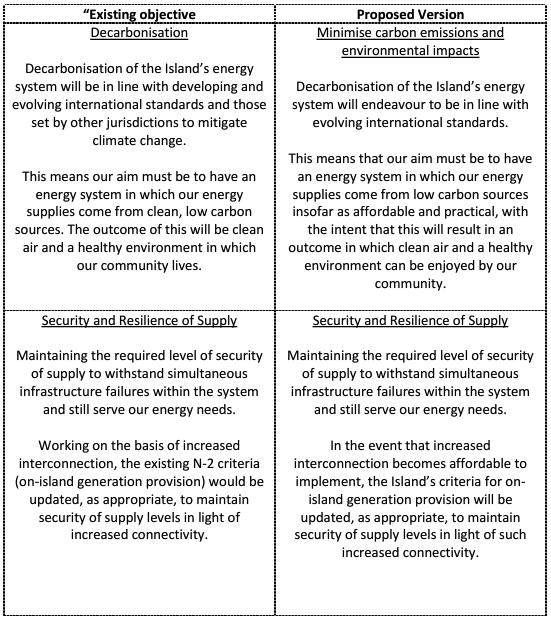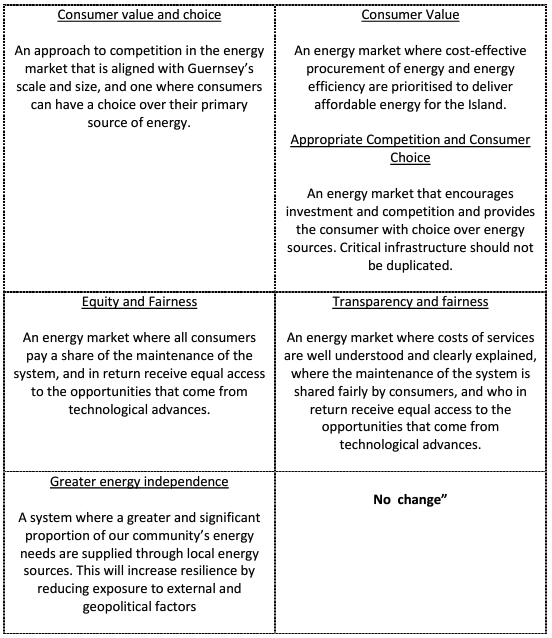


There has been a 'glaring omission' in the upcoming Electricity Strategy according to two deputies, who want to make sure any future strategy is affordable, not cost-optimal.
Deputies Bob Murray and Sam Haskins want to amend the long-awaited Electricity Strategy, which will be debated this week after months of delay.
They not only want to stress the importance of affordability in any future pathway, but have offered up their own alternatives to the Energy Policy Objectives already included in Environment and Infrastructure’s Policy Letter.
“When the Energy Policy proposals 2020-2050 were approved in the closing days of the previous assembly in May 2020... it is the view of the Proposer and Seconder that a significant omission occurred in not proposing or recognising the fundamental role that affordability must play when it established the [Energy Policy Objectives],” said Deputies Murray and Haskins.
“It is inconceivable to presume that Policy objectives (of any description) can be endorsed without the limitation of their delivery being financially possible within the context of the associated market and what it will bear. The Oxford Dictionary definition of ‘affordable’ is ‘the fact of being cheap enough that people can afford to buy it or pay it’.”


Pictured: The proposed alternatives to the Energy Policy Objectives put forwarded in the amendment.
Deputies Murray and Haskins argue that using the word ‘cost-optimal’ avoids stipulating how affordable the objectives will be.
“This issue of affordability is critical and especially so in the Committee’s current recommendation in proposition 2(a) that Pathway D becomes the States Strategic direction,” they said.
E&I has developed six supply ‘pathways’ to future energy generation in Guernsey, noting that the island needs to invest in critical infrastructure while also aligning itself with carbon neutrality targets set within the Energy Policy 2020-2050.
E&I’s preferred option is option D – dual interconnectors with offshore wind. This supply pathway includes a 100MW direct cable to France, in addition to the current cable that already connects Guernsey to France via Jersey.
It also includes the proposal for a ‘fixed-bottom’ offshore wind farm that could supply Guernsey with 65MW of energy, and an allowance for solar panel generation as well.
The Committee isn’t asking for any concrete decisions, just an agreement on direction for the future of energy generation.

Pictured: Deputies Murray (R) and Haskins (L).
The amendment indicates that affordability is critical because option D “includes a second interconnector (GF1) despite there being no indication that negotiations have yet to provide an affordable contract price for the purchase of electricity it would be designed to carry”.
“Given the massive impact upon electricity prices worldwide in the wake of the war in Ukraine, it is by no means a given that the affordable contract price we currently enjoy transmitted over GJ1 will be available to us on that existing cable, let alone a second,” said Deputies Murray and Haskins.
“It is therefore of paramount importance that the likely contract price of electricity is negotiated before we invest time, effort and cost in specifying a second interconnector.
“Furthermore, Pathway D includes Offshore Wind which is the most expensive of the renewables currently on offer. That is in respect of construction, maintenance and subsequent decommissioning. The rotor blades for instance contain toxic substances which requires them to be buried – and they are enormous.
“There are also increasing concerns that the windfarm marketplace has significantly changed and that the economics of windfarms is no longer as cost-effective, reliant as it has been upon an acceptable contract for difference (CfD or guaranteed subsidy) between operator and intended market.“
It is the fourth amendment lined up before what is already expected to be a long-winded contentious debate on the future of energy generation in Guernsey.
Comments
Comments on this story express the views of the commentator only, not Bailiwick Publishing. We are unable to guarantee the accuracy of any of those comments.